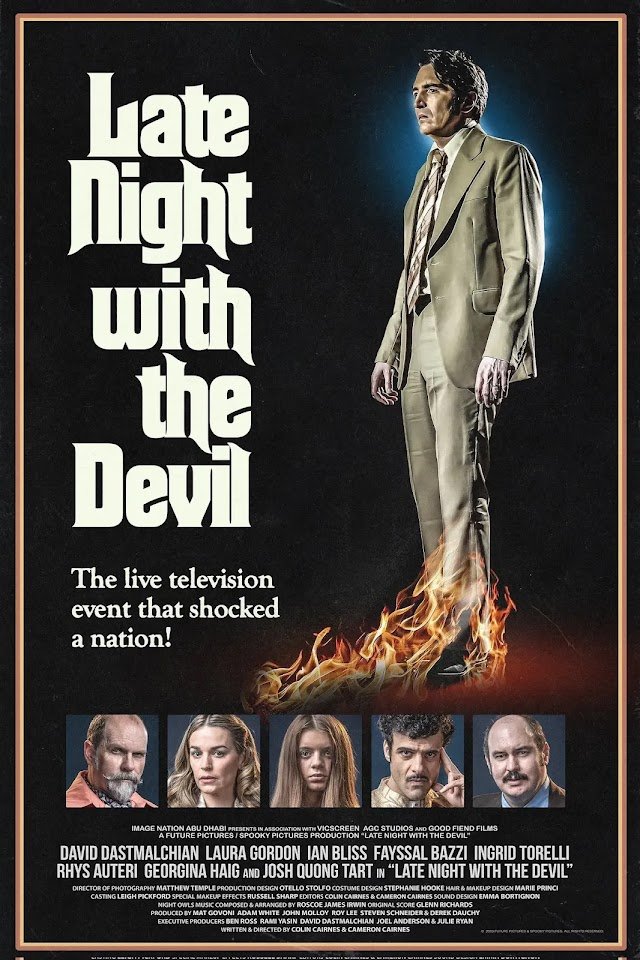Late Night With AI
Credit: IFC Films/Shudder
In the midst of the indie horror whirlwind, where every shriek and shadow holds a tale of terror, a recent release has found itself engulfed in a storm beyond the confines of the screen. "Late Night with the Devil," a film steeped in the nostalgic allure of 1970s television and dripping with supernatural intrigue, emerged onto the scene, captivating audiences with its eerie narrative and masterful practical effects. Co-crafted by the Cairnes brothers, Cameron and Colin, this indie treasure first mesmerized viewers at SXSW with its spine-chilling tale.
However, as the film reached broader audiences, a shift in focus occurred—one that veered away from the captivating performances and the sheer fun it promised. Instead, attention honed in on a groundbreaking but contentious aspect: the integration of artificial intelligence (AI) to augment specific visual elements. While the lead actor's performance and the film's immersive experience were initially lauded, the buzz surrounding the utilization of AI in certain scenes began to overshadow these highlights.
In a recent statement to Variety, the Cairnes brothers disclosed their exploration into AI experimentation for their film, "Late Night with the Devil." They utilized AI to generate three still images, seamlessly integrating them into the narrative as brief interstitials. While some praised these AI-generated images for their innovative approach to capturing the '70s aesthetic, their inclusion ignited a heated debate within the creative community.
This backlash against "Late Night with the Devil" has sparked a broader discussion about the role of AI in cinema. The Cairnes brothers' venture into AI-assisted artistry unintentionally thrust the film industry further inoo into a contentious debate. The use of AI in filmmaking, once a novel concept, is now under increased scrutiny, especially in light of recent actors' and writers' strikes that highlighted concerns about job security.
As the controversy surrounding "Late Night with the Devil" continues to simmer, it serves as a poignant reminder of the ethical and creative considerations inherent in the use of AI in filmmaking. While the Cairnes brothers' experiment with AI has ignited debate, it also sheds light on broader questions about the future of storytelling in the digital age.
Filmmakers and industry stakeholders find themselves at a crossroads, grappling with the implications of integrating AI into the creative process. On one hand, AI offers unprecedented opportunities for innovation, allowing filmmakers to push the boundaries of visual storytelling and explore new artistic frontiers. On the other hand, concerns about job displacement, ethical implications, and the preservation of artistic integrity loom large.
The recent actors' and writers' strikes, which brought attention to the potential ramifications of AI on job security, serve as a stark reminder of the need for careful consideration and dialogue within the industry. While AI may streamline production processes and enhance visual effects, it also raises fundamental questions about the role of human creativity and craftsmanship in filmmaking.
Ultimately, the debate surrounding AI in cinema calls for a nuanced approach that balances technological advancement with ethical considerations. As filmmakers navigate this complex terrain, it's essential to establish clear guidelines and ethical frameworks to ensure that AI serves as a tool for creativity rather than a threat to artistic expression.
In the ever-evolving landscape of filmmaking, where innovation and tradition intersect, the use of AI poses both challenges and opportunities. As discussions surrounding "Late Night with the Devil" continue, it's evident that the intersection of AI and filmmaking raises complex ethical and creative considerations. By engaging in open dialogue and collaborative efforts, filmmakers can chart a course that harnesses the potential of AI while preserving the essence of storytelling that defines the cinematic experience. While the film's use of AI sparked controversy, it also prompted broader conversations about the future of storytelling in the digital age. The future of filmmaking lies not in the capabilities of AI alone, but in the thoughtful and responsible integration of technology with human ingenuity as filmmakers navigate this evolving landscape, grappling with the balance between technological innovation and artistic integrity.
For the love of movies,
Jonathan Austin

